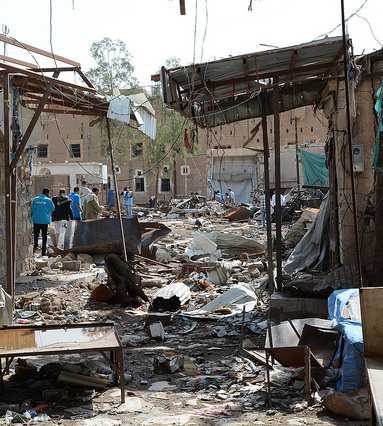In his latest report on the protection of civilians in armed conflict, the UN Secretary-General again called attention to the civilian suffering caused by the bombing and bombardment of towns and cities, and urged states to “engage constructively in continuing efforts to develop a political declaration to address the issue.” Moves towards a political declaration were commenced by Austria last year. The use of explosive weapons in populated areas is highlighted in the report as a priority concern for civilian protection, and the Secretary-General calls for greater efforts on this problem.

The city of Saada in Yemen, which has been hit heavily by airstrikes (© UNOCHA/Phillipe Kropf https://flic.kr/p/BwWvF7)
Citing data from INEW member Action on Armed Violence (AOAV), the report describes the harm caused by the widespread use of explosive weapons in populated areas in conflicts across the world, noting that it kills thousands of civilians, destroys vital infrastructure, and leads to mass displacement. Furthermore, the report emphasises that such effects “are largely foreseeable and can often be avoided or minimized.” The Secretary-General draws attention to AOAV’s finding from its 2015 data that where explosive weapons were recorded to be used in populated areas, “an astonishing 92 per cent of those killed or injured were civilians.”
Noting that Syria and Yemen were most severely affected by the use of explosive weapons in populated areas in 2015, followed by Iraq, Nigeria and Afghanistan, the report states that more than 9,000 people were recorded killed or injured by explosive weapons in Syria by AOAV in 2015, and more than 6,000 in Yemen. UNICEF also recorded more than 900 incidents of children killed or maimed by explosive weapons in Syria in 2015, and UNOCHA reported that water infrastructure serving 900,000 people was damaged by explosive weapons in Yemen, according to the report.
Civilian harm from the use of explosive weapons in populated areas recorded by UNAMA in Afghanistan is also highlighted, as well as similar patterns of harm in Iraq, Libya and Ukraine. UNOCHA recorded over 150 healthcare facilities and 400 schools damaged by explosive weapons in Ukraine in 2015, the report says. On the dangerous legacy of explosive remnants of war that the use of explosive weapons in populated areas also leaves, hindering humanitarian action and the return of individuals to their homes, the report notes among other examples that “only 30 per cent of the 7,000 explosive remnants of war estimated to remain from the hostilities in Gaza in the second quarter of 2014 had been confirmed as removed” according to UNOCHA.
Given the dire picture of humanitarian harm that his latest report elaborates, the Secretary-General says:
I repeat my call for parties to conflict to refrain from the use of explosive weapons with wide-area effects in populated areas, owing to the widespread and predictable pattern of harm that results from such use. I encourage Member States to develop policy guidance aimed at reducing the humanitarian impact of explosive weapons in populated areas, to engage constructively in continuing efforts to develop a political declaration to address the issue and to support efforts to protect civilians from contamination arising from explosive remnants of war.
His recommendations also call on states to raise awareness of “the widespread and predictable pattern of harm that results from the use of explosive weapons with wide-area effects in populated areas” and to collect and share practice on minimising this harm.
His report on Children and Armed Conflict, released in April, also highlights the explosive weapons issue, linking the prevalence of attacks on schools and hospitals in 2015 to the increasing use of explosive weapons in populated areas, and calling on “all parties to conflict to refrain from using explosive weapons with wide-area effects in populated areas, and to consider making a commitment to this effect.”
The UN Secretary-General has consistently highlighted the use of explosive weapons in populated areas, particularly those with wide-area effects, as a significant humanitarian issue and problem for civilian protection, including for the recent World Humanitarian Summit. More than fifty states, as well as UN agencies and the International Committee of the Red Cross, have now recognised the use of explosive weapons in populated areas as a specific humanitarian problem. A political declaration, through which states can commit to concrete actions to limit the harm caused by the use of explosive weapons in populated areas, would represent a first step towards addressing the devastation caused by this practice. INEW urges all states to heed the Secretary-General’s call to act.
Read more
2016 UN Secretary-General’s report on the protection of civilians in armed conflict
INEW’s briefing book on a political commitment on explosive weapons ‘A Commitment to Act‘
